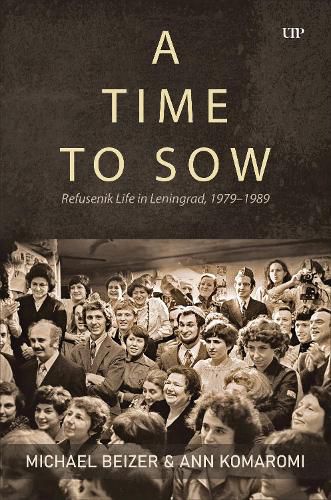Readings Newsletter
Become a Readings Member to make your shopping experience even easier.
Sign in or sign up for free!
You’re not far away from qualifying for FREE standard shipping within Australia
You’ve qualified for FREE standard shipping within Australia
The cart is loading…






A Time to Sow offers a glimpse into the unofficial Jewish life in 1980s Leningrad, shaped by numerous long-term refusals from authorities to grant exit visas to Jews seeking to migrate to Israel. The book reveals how the lives of the 'refuseniks' were marked by a continuous struggle for the right to emigrate, as well as by the formation of an informal community. It traces how the community provided mutual assistance in times of distress, particularly offering support to imprisoned activists and their families. The community also maintained contacts with co-religionist supporters visiting from abroad, engaged in Hebrew teaching, facilitated religious revival, celebrated Jewish holidays as a group, disseminated samizdat publications, conducted popular lectures on Jewish history and culture, and pursued Jewish studies. The book divulges how all these activities took place in private, despite the ban and persecution by the authorities.
Drawing from analyses of historical sources, rare archival materials, as well as personal experiences including interviews with activists, the book provides a rich and nuanced understanding of this unique period. Ultimately, A Time to Sow presents a critical, non-apologetic perspective to uncover a distinctive, little-known chapter of Russian Jewish history in Leningrad, one of Russia's most important cities.
$9.00 standard shipping within Australia
FREE standard shipping within Australia for orders over $100.00
Express & International shipping calculated at checkout
A Time to Sow offers a glimpse into the unofficial Jewish life in 1980s Leningrad, shaped by numerous long-term refusals from authorities to grant exit visas to Jews seeking to migrate to Israel. The book reveals how the lives of the 'refuseniks' were marked by a continuous struggle for the right to emigrate, as well as by the formation of an informal community. It traces how the community provided mutual assistance in times of distress, particularly offering support to imprisoned activists and their families. The community also maintained contacts with co-religionist supporters visiting from abroad, engaged in Hebrew teaching, facilitated religious revival, celebrated Jewish holidays as a group, disseminated samizdat publications, conducted popular lectures on Jewish history and culture, and pursued Jewish studies. The book divulges how all these activities took place in private, despite the ban and persecution by the authorities.
Drawing from analyses of historical sources, rare archival materials, as well as personal experiences including interviews with activists, the book provides a rich and nuanced understanding of this unique period. Ultimately, A Time to Sow presents a critical, non-apologetic perspective to uncover a distinctive, little-known chapter of Russian Jewish history in Leningrad, one of Russia's most important cities.